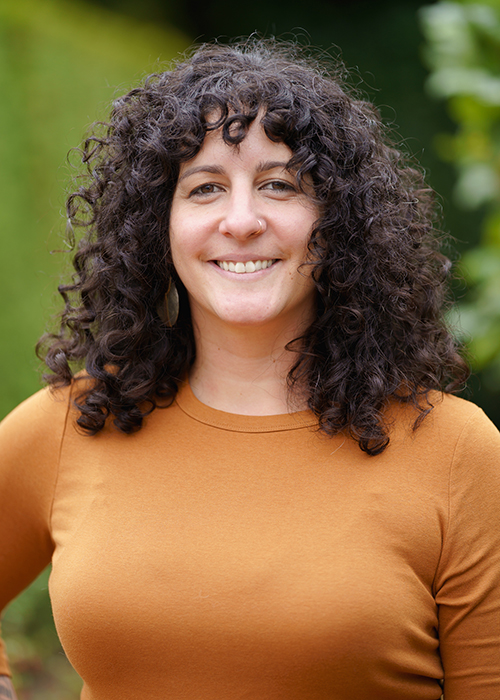
What influenced you to pursue a degree in nutritional sciences?
Growing up with a large extended Puerto Rican family, food was a way for us to show and give love. It has always been one of my greatest passions and interests and I knew from a young age that it would somehow be involved in what I pursued professionally. I attended culinary school and worked in kitchens in Seattle for about 7 years. I loved working directly with food, but I knew there must be another way to integrate it into my working life without the long hours and physically taxing lifestyle, which was affecting my own health in the process. These experiences led me back to school at the age of 30 where I earned a Bachelor of Science in Nutrition, and now am doing my graduate study here at the University of Washington.
Why did you choose UW?
As an undergrad I realized there were many facets of food, health, and wellness industries I could pursue with a master’s degree in nutritional sciences. My main interests were how I could both continue to interact with food while also helping groups of people who could benefit from the knowledge I have gained in school. UW is known for having a wonderful School of Public Health, focusing on both collaborative and integrative health. This reputation guided my decision to pursue a degree here at UW.
What kind of research or internship are you doing?
My thesis is focused around a survey of farmers in Washington state to identify how COVID-19 has impacted their businesses through the lens of food system resilience. Specifically, the survey data illuminates how farms of different characteristics had various and differing experiences throughout the pandemic, and whether and how farms were able to continue function. I will begin my practice experience in winter quarter.
How would you describe the benefits of your research or how it may potentially impact public health?
The pandemic has thrown a wrench in even the best laid plans for every part of the food system and it is important to understand what has worked and what hasn’t, through quantifiable data. The data gathered with the survey has already produced a memorandum and research brief and the information has been used by the Washington State Department of Agriculture to help target aid and relief efforts.
Tell us about your project with Washington state’s WIC program?
Earlier this year I completed my public health fieldwork project with the Washington Women, Infants, and Children (WIC) Supplemental Nutrition Program through Public Health – Seattle & King County, and developed an informational tool explaining WIC to incoming participants. Since COVID-19 made it difficult or impossible to meet in person, the tool I produced introduces potential WIC recipients what the program entails in a concise and effective way. It has been translated into 5 languages and will hopefully be accessible to all WIC locations within Washington state. Working with WIC was a wonderful experience! I learned more about the program, and enjoyed working with my preceptor, someone I will be reaching out to if I decide to pursue a career within the DOH.
What are your future goals?
My experience working with the WIC program has sparked my interest in federal food supplemental programs, and in the future I would love to work with groups focused around community nutrition program development, specifically within marginalized communities. My thesis project also introduced me to survey development, which is a central component to many types of nutrition analysis. I would also love to see what types of jobs are out there that utilize this skill set.
What extracurricular activities do you enjoy?
I love biking around the city, it’s a great way to explore new places. Usually yoga and long walks are the way I get my body moving and feeling good. As an extrovert I also enjoy spending time with friends, but staying home with a good book or movie is always warranted. Before the pandemic travelling was a huge part of my life and while I haven’t been able to travel to new countries, I’ve been able to explore this beautiful country. Finally, cooking is the main activity I enjoy to unwind, plus you get a delicious meal at the end!
What do you like most about living in Seattle?
While it’s no secret that this is a beautiful city to live in, my favorite thing is the food scene here. Washington is an agricultural hub, and in Seattle we get to reap the benefits of wonderful produce mixed with cooking talent. From the small mom and pop restaurants to fine dining there’s something here for everyone and we get to experience the bounty that this state provides!
Tell us a fun fact about yourself
For a short period of time before going back to school I did specialty cheese distribution with a locally owned distributor who imported rare European cheeses. Some of these cheeses had never been distributed in the United States! This harnessed a lifelong love of cheese that persists to this day.
What advice would you give a student who is considering graduate study with the UW Nutritional Sciences program?
Come into the program interested and curious, but don’t feel forced to have everything figured out. Graduate school is where you’ll be able to explore those ideas and concepts that have fascinated you and really dive into what ways they could be manifested into a career. This program is challenging and fast, so it’s important to have things in your life lined up so that school can be your primary focus. This also allows for the absorption of everything you’ll be learning, which is quite a lot! Don’t be afraid to ask questions and advocate for yourself throughout this process.
Interested in studying nutrition as a graduate student? Explore our graduate study and RDN training offerings in the Nutritional Sciences Program.